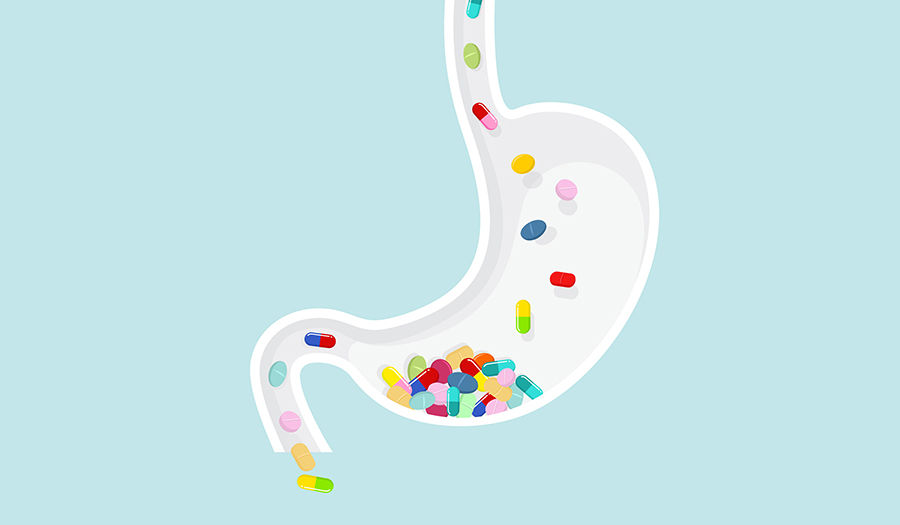 Getty Images
Getty Images
Article
Learn the why behind the headlines.
Subscribe to the Real Truth for FREE news and analysis.
Subscribe NowYour body contains various major systems that must function well to experience good health. Of these, the digestive system is crucial. It is through this intricate system that nutrients from the foods you eat are transferred into your blood and to every cell throughout your body.
Think of each step in the digestive process as continually breaking down food to be used at the blood and cellular levels. Once vital nutrients are extracted, any remaining waste is eliminated.
As we age, our ability to break down foods and absorb nutrients begins to slow. Most people have come to accept the resulting effects of this: heartburn, bloating, constipation and irritation of the digestive tract.
Many look to ease discomfort through use of short-term over-the-counter medications. Think of the “pink stuff” that coats your stomach, fizzy tablets dropped into water, and handfuls of chewable, rainbow-colored antacid tablets.
Americans in increasing numbers are resorting to supplements to manage their digestive health. In its 2021 Consumer Survey on Dietary Supplements, the Council for Responsible Nutrition found that 4 out of every 5 Americans use supplements for dietary purposes—a record high.
Are supplements all it takes to improve your digestive health?
Widespread Problem
The problem of poor digestive health has reached staggering levels. Consider three of the most well-known issues: heartburn, constipation and gastroesophageal reflux disease.
The industry for products to treat heartburn symptoms is a substantial over-the-counter medicine category in the United States. According to the Consumer Healthcare Products Association, over $2.1 billion worth of heartburn-related products were sold in 2021.
Constipation, which is infrequent or difficult bowel waste elimination, has also become a major issue in the U.S. The American Journal of Gastroenterology reported that 9 to 20 percent of adults in the U.S. experience chronic constipation. Pain, hemorrhoids and vomiting can result from extended periods of non-elimination.
People often confuse GERD with heartburn. Though they are related, GERD is a more severe form of reflux. While heartburn is a frequent symptom, other symptoms of GERD include:
Regurgitation of food or sour-tasting liquid
Coughing, wheezing and difficulty swallowing
Severe chest pain while lying down
According to the National Institute of Health, GERD affects about 20 percent of Americans.
How the System Works
To help prevent digestive problems, you need basic knowledge of how a normally functioning gastrointestinal tract works.
Think of the tract as a hollow tube running through the middle of your body. It is where the initial steps of digestion begin.
The process starts in the mouth: Food is mixed with saliva and systematically broken down by chewing it into smaller pieces. The semi-liquefied food is then swallowed and brought into the stomach. There it is further broken down by powerful stomach acids and enzymes.
Food then proceeds to the small intestine where probiotics (“friendly” bacteria lining the intestines) continue breaking it down so that it is small enough to be carried to every cell in the body.
When functioning properly, the system can handle almost all that passes through it.
Take for instance the digestive health of teenagers. They can eat rich, fatty foods or sugary, carbonated drinks without facing as many consequences as those in their 50s or 60s. That is because, as our bodies age, so do our digestive pipes. They can eventually lose the powerful stomach acids, healthy probiotic bacteria, and digestive enzymes that enhance the body’s ability to break down foods.
When this happens, negative symptoms appear—heartburn, upset stomach, constipation. These are all signs of malfunction in the body’s digestive process.
To illustrate the impact of a failure in the digestive process, consider what occurs in the stomach. Imagine squishing a meal of roasted chicken, vegetables, brown rice and salad inside a large Ziploc bag and placing it outside on a slab of concrete on a hot sunny day. (This is analogous to food sitting for several hours in the near 100-degree environment of the stomach.)
In as little as 30 minutes, the plastic bag of food would start to bloat and swell as gases released by bacteria build up inside. Since there was no liquid inside the container, the food would take longer to break down and would eventually rot.
This pictures what takes place in the stomach when it lacks sufficient helpful digestive acids and enzymes to break down food.
Practical Tips
To improve your digestive health, supplements can play a role. Probiotic supplements and digestive enzyme supplements are beneficial in some circumstances.
However, these are not to be treated as a cure-all for digestive ailments. According to Everydayhealth.com: “A report published in February 2019 in The Lancet Gastroenterology & Hepatology stated that while 3.9 million people in the United States regularly take probiotic supplements, these supplements can vary in their effectiveness, since those sold as dietary supplements do not require approval from the U.S. Food and Drug Administration (FDA). Probiotic supplements can be quite different in their strains of bacteria and dosing, making them difficult to compare.”
If you choose to take supplements to help address digestive health issues, be sure to do your own research and, if necessary, speak with a health professional before deciding what or how much to take.
Carrie Daniel-MacDougall, a nutritional epidemiologist at MD Anderson who studies diet, stated on the research center’s website, “I think supplements are popular because we want a quick fix.” She added, “We’re hoping that a pill can fix everything. Unfortunately, that’s not the case.”
Supplements alone will not cure or prevent problems. No one would suggest, for instance, that a person could eat the earlier-referenced teenage meal of pizza and soda every day and be fine if the right supplements were also ingested. You must also employ simple changes to your behavior that promote normal digestive function. Here are a few examples.
First, drink enough water. According to WebMD: “Dehydration is one of the most common causes of chronic constipation. The food you eat makes its way from your stomach to the large intestine, or colon. If you don’t have enough water in your body already, the large intestine soaks up water from your food waste. This makes you have hard stools that are difficult to pass.”
A good rule of thumb to ensure you are drinking enough is to divide your body weight (in pounds) by two. The result is the amount of water (in ounces) you should drink each day. Consider downloading a water reminder app on your smartphone to help you keep up. Meanwhile, avoid sugary, carbonated beverages, which can dehydrate the body.
The second simple change is to eat more unprocessed foods, including vegetables, whole grains, lean meats, and anything that goes through minimal processing before it reaches your table. At the same time, reduce your consumption of foods that are highly processed.
Medical and nutrition experts are increasingly making the connection between the consumption of processed foods—which contain additives, preservatives and chemical ingredients—and poor health.
Also, be sure to chew your food thoroughly. Even healthy foods can cause digestive issues if not chewed properly.
By applying just these simple changes to your routine, you will notice improvements in your digestive health right away.
To learn much more about proper nutrition and other ways to attain vibrant health, read our free booklet God’s Principles of Healthful Living.
More on Related Topics:
- Afghan Hunger Crisis Deepens as Aid Funding Falls Short, UN Says
- Israel’s Longest War Is Leaving a Trail of Traumatized Soldiers, With Suicides Also on the Rise
- Maintaining Your Health as You Grow Older
- The Blind to See—Humanity’s Fight to Cure Blindness
- ‘Nightmare Bacteria’ Cases Are Increasing in the U.S.



